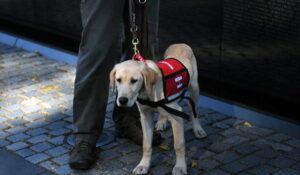Tag: service dogs
Friar’s Best Friend: Understanding the Importance of Service Animals at College
by The Cowl Editor on September 12, 2019
Campus

by Alexandra Huzyk ’20
News Staff
Jacqueline Kelley ’20, owner of the most well-recognized service dog on campus named Moose, says, “He’s definitely my best friend and is the most reliable, always.”
Kelley has had the three-year-old golden retriever for one and a half years now. She said, “He’s given me a good sense of responsibility and has educated me on what it is like to have a service dog.”
The Disability Support Manual states that the College is “committed to providing students with disabilities equal access to programs, facilities, services, and activities at PC. The College will make every effort to provide “reasonable accommodations” so that students can be ensured equal access and work to remove any barriers which may prevent this from occurring.”
When talking about Moose, Kelley shared, “I decided to get a service dog because I was struggling with doing anything independent off campus.”
She went on to explain, “I’ve always felt very helpless and vulnerable, and I felt like I was relying on people to do simple things, like standing up from a seated position. But now I know that Moose is emotionally and physically there for me.”
Moose was previously an emotional support dog for a child who had a lot of aggression, but was removed from that situation because he became the target of that aggression. He was then trained for Kelley as a service dog. She says, “The very first step was just trying to get him used to my scooter, in order to complete tasks like backing up in small spaces.”
The Providence College Division of Student Affairs-Residence Life Policy, states: “The work or task a Service Animal has been trained to provide must be directly related to the functional limitations of the person’s disability.”
“When he’s not working, he’s just a dog like every other dog,” shares Kelley. “If I go into a public building or am on campus, I always keep his vest on and have him working.” Kelley cites that the main difficulty she typically faces on campus is people petting Moose when he is working.
“I’ve never had any problems with professors not wanting him in class,” says Kelley. “Students are pretty open about it, but it is difficult to navigate how to go about being around a person who is afraid of dogs because we both have a right to be somewhere.”
Kelley explained different ways to go about getting a service animal, but recommended that the best way is to go through a service dog company that would certify the animal through Assistance Dogs International.
Through this program, a dog is picked based on a person’s particular needs, and then the dog is trained for that specific person. This particular certificate allows a service dog to be recognized overseas, which is a struggle that Kelley faced with Moose when she studied abroad in Dublin, Ireland.
“He was the biggest help, mainly for emotional reasons. It’s difficult for any person with or without a disability to acclimate to a foreign city,” says Kelley. “With him I felt more confident in going out in the city by myself and taking planes when traveling. He really helped me with my independence.”
Besides being an active member of the Providence College community, Kelley, along with three other students, formed a club named B.E.L.I.E.V.E. (Be Educated, Live with Inspiration, and EValuate Equality).The club discusses issues related to disabilities and works to educate the PC community.
The club welcomes people with or without disabilities, offering a space for people to share their experiences and ask questions.
Kelley hopes that her experiences with Moose, especially abroad, will help her to pursue a career in disability advocacy after graduation. She hopes to attain a masters in disability studies, from either a social or public policy angle. “I would really like to work in urban development to make cities more accessible,” Kelley shares.
